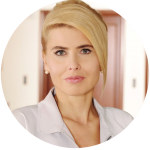Stem cells – are cells that have the ability of self-renewal of its pool and the ability to transform into other types of cells.
What can you learn from this article?
- What are MSC and ESC?
- How are stem cells used in dentistry?
- Is it safe to collect stem cells?
Advances in regenerative medicine in the recent years have proven that new possibilities in dentistry include not only synthetic implantable materials that come from animals or from a cell bank (used for example in parodontosis treatment or in surgical or implantological treatment) but first and foremost autogenous materials derived from the patient. It is the so-called gold standard in treatment, because patients become the infinite source of their own treatment. Moreover, this solution also lowers the costs of treatment.
What are MSC and ESC?
Stem cells make it possible to replace damaged, ill or absent tissue because they can divide themselves infinitely into all types of cells present in our bodies. Thanks to advancements in medicine, it is possible to collect embryonic stem cells (ESC) from embryos, egg cells or cord blood (which has always triggered ethics-related discussions in the whole world) and also from developed tissue of all organisms (both animal and human). In the case of adults, stem cell called mesenchymal stem cells (MSC) are used in cell therapy and regenerative medicine (e.g. orthopedics, dentistry, cardiac surgery, vascular surgery) and are derived from bone marrow, peripheral blood, adipose tissue or synovial membrane of joints.
How are stem cells used in dentistry?
For the purposes of dental procedures, stem cells are mainly derived from bone marrow from the pelvis (Iliac crest). The collection procedure is completely safe for the patient. The material derived from bone marrow containing stem cells is cleansed and concentrated and when it is condensed, it is administered in the treated area where we wish to reconstruct damaged cells or extensive tissue defects. In the case of dental treatment, these areas include: post-extraction alveolar ridges, bone cysts, tissue defects in parodontosis, maxilla or mandible regeneration for future prosthetic treatment, that is implanto-prosthetic treatment. Cells multiply and assume functions of the ill or absent structures, and the clinical results are very impressive. Osseous tissue and soft tissue regeneration is significantly improved, their vascularisation and healing are better, and the number of complications after the procedure is largely decreased. Stem cells also prevent scar tissue, decrease the number of infections, enhance growth and are often used in the case of already present tissue necrosis.
Is it safe to collect stem cells?
Yes, the collection procedure is completely safe for the patient and poses no risk provided that it is conducted by a professional doctor and in proper conditions.
Mieszkam i pracuję w Warszawie. Praktykę lekarską prowadzę od ponad dwudziestu lat. Jestem współwłaścicielką kliniki stomatologicznej Trio-Dent, gdzie leczę pacjentów, prowadzę badania naukowe, ale też udzielam pomocy osobom, które jej potrzebują.


